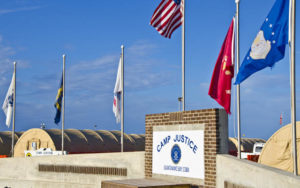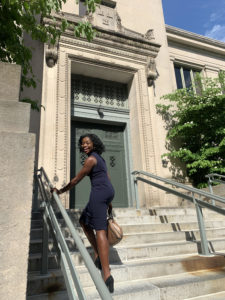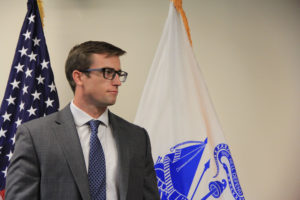It has often been said that you can do anything with a J.D. from Harvard Law School. But that statement is somewhat misleading, because HLS students put their knowledge, leadership, ambition, and blossoming legal skills to use well in advance of graduation. Keep reading to learn more about the exciting and diverse experiences of four of our AFA members from this past summer!
———————-
Faith Jackson (JD ’22, @keepthefaithj) spent the summer working remotely for Covington & Burling LLP. Her case work included entertainment litigation, transactional, and white collar work, as well as a pro bono where she interviewed a Marine Corps veteran applying for a discharge upgrade in order to receive benefits. The final couple of weeks were spent in-house at a medical client looking to increase cancer awareness in the African American community. Faith appreciated the balance of law firm, public impact and in-house work, and would encourage incoming 1Ls to pursue diverse opportunities.
———————-
Coast Guard veteran Thomas “Buddy” Bardenwerper (JD/MPP ’22) interned in-person for the Chief Prosecutor of the Office of Military Commissions in the nation’s capital. Buddy supported this joint-DOD/DOJ mission by conducting research and writing for the 9/11 and USS COLE prosecution teams. He was honored to fight for justice for those lost in those two attacks.
———————-
Nick Rawls (JD ‘22) worked with the Enterprise, Major Crimes, and Cyber Division in the Massachusetts Attorney General’s Office. The amazing thing about this otherwise ‘standard legal internship’ is that a significant component of the work had a direct tie to his Army background as a Civil Affairs Officer in Afghanistan. Like most summer internships, a lot of the work involved legal research and drafting motions, however because of his experience mapping human terrain in the Army, he had an opportunity to develop Social Network Analysis training for prosecutors and other law enforcement. Broadly speaking, Social Network Analysis is the process the military used in Afghanistan to map the relationships that connect members of a society (at the village, town, or even provincial level), and then draw out key individuals and groups within the society in order to better understand the associations between those individuals/groups. The military utility of knowing who’s who in an area of operations (as well as their attitudes towards US forces, the local/national government, and other non-state actors in the AO) is fairly self evident, but Nick was surprised at its applicability to law enforcement’s effort to disrupt opioid trafficking organizations. If the process is used correctly, it can actually help avoid some of the pitfalls associated with over-policing. By measuring things like network density, the ‘central-ness’ of an individual, and the strength of the ties between actors within the network, police can allocate the resources directly towards leaders of fentanyl trafficking organizations while also identifying the individuals who are less likely to be engaged in serious criminal activity. Ultimately, Nick’s research was developed into a training presentation that went out to a national audience of law enforcement.
In Nick’s own words, “I figured I’d share my experience because I thought it might be cool to let former service members know that their military experience can be useful to legal employers in totally unexpected ways, and goes beyond just allowing them to talk about how they hire vets.”
———————-
Riley Vann (JD ‘22) spent her 1L summer interning for the Hanscom Air Force Base legal office, working on civil and criminal matters for the base. On the civil side she processed tort claims, drafted legal reviews, and facilitated pro bono legal assistance for active duty members, veterans, and their dependents. On the justice side she spoke to witnesses, did legal research, and developed trial strategies for developing criminal cases. “It was nice to get back in an Air Force uniform, and I look forward to my future gig as a Judge Advocate!”


